The Research Institute on Japanese Military Sexual Slavery organized an interview between philosopher Rada Iveković and anthropologist Young-Gyung Paik. Through this interview, we look forward to a discussion that breaks away from the framework of masculinized war and feminized victimhood. With the combined historical imagination of the two researchers, it may be possible to chip away at the trinity of statism, nationalism, and patriarchy that is responsible for gendering warfare and shaping particular memories.
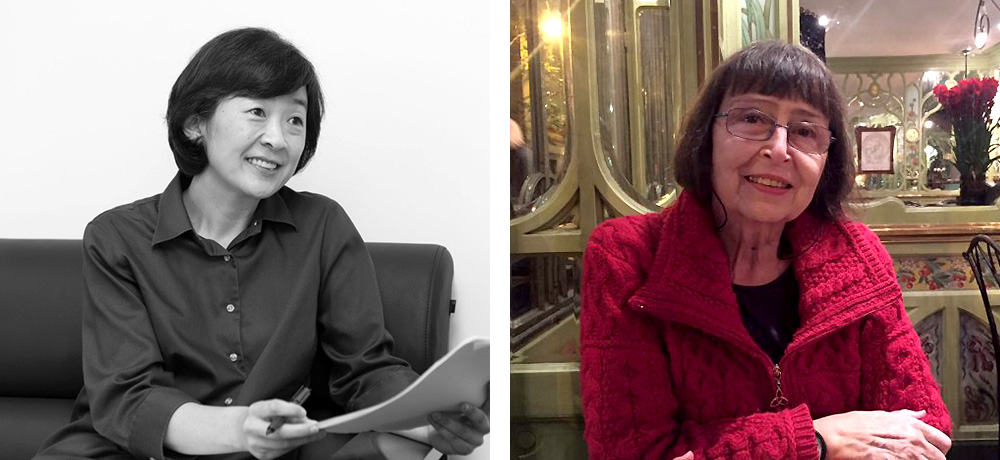
The Fall of Socialism and a Backlash against Women
Young-Gyung Paik
I would like to start with the history that you are most familiar with, namely the partitioning and breakup of Yugoslavia. Could you tell us more about the political and societal changes experienced when socialism was being dismantled in the former Yugoslavia, and why and how the partition created such a gendered form of warfare?
Rada Iveković
In former socialist countries that were involved in the transition to capitalism after 1989, whether explicitly or not, what happened was that social and public property was sold overnight. It was really a blitz, rapidly carried out by local bullies, politicians, and mobsters who became the oligarchs of the new capitalism in former socialist countries. They had bought industries, land, and people for nothing. In exploiting them, they engaged in acts of extractivism and accumulation with foreign investors and collaborators, as well as others. In the immediate aftermath of the fall of socialism, the populations of the socialist countries were reduced to extreme poverty, especially in the former Soviet Union: dire poverty, hunger, falling life expectancy. They couldn’t find any goods or facilities because everything had been plundered. Lawlessness reigned and large-scale gangsterism was rife in most of the European post-socialist countries. Human rights became more or less nonexistent, women’s rights even more so. When there was a war going on, as was the case immediately after 1989 in Yugoslavia, it was the worst possible situation for everyone—but for women especially. At the same time, there was a process of plundering and of canceling all rule of law. This process happened in parallel to the war.
When it comes to women’s rights, there is always the possibility for agreement, negotiation, alliances, and compromise—compromising with the various types of domination at hand, the forms of masculine domination. During this post-socialism period, women lost their specific human rights: under socialism, women had enjoyed, at least nominally, not only human rights in general but also their specific rights as women, and all of this was taken away. They could no longer apply for support from the state as they had been able to in the past, when they could count on their rights. There was no state that was not actually engaged in the repatriarchalization that was taking place.
Young-Gyung Paik
I will dwell a little more on the theme of partitioning and reunification. Could you tell us more about universal democracy? Why do you see universalism, or some form of universal democracy, as being so important in the current context?
Rada Iveković
The universalism i have in mind positions all of us members of the human species on an equal basis. Universal means “whole.” This universal whole is compounded with so many particularities and differences; politically, what happens is that universalism becomes associated with one of the particularities, the dominant one. That is what usually happens. Now, this is not what we want. We want all the particularities, all the differences, all the minorities, and all the sensibilities to be visible and to have access to rights. This is what would be an abstract scheme of universal democracy—nothing else. In that sense, i can defend the universal, the whole. And i can defend universality. In many social sciences and leftist narratives, it has been dismissed. But i don’t think it can be dismissed, because as feminists we are universalists. After all, we don’t work for women alone. As feminists, we know that we need to share, and we want to share with others.
Democracy for all would mean universal democracy. Of course, this is ideal; we never have that in practice. But we can be nearer or further from it because the examples we have always exclude someone or subordinate someone. Women are included as subordinates; they are not completely excluded. But we want more than that. At the same time, when we talk about universal democracy, this is also problematic as a concept because it is so wide and abstract. Especially when we see it in practice, we may come to harbor doubts about democracy, or the possibility of ensuring democracy. In conditions of capitalism, we back parliamentary democracy. This is what we have. It is always less than the ideal. But the loftier the utopia and the ideal is, the more abstract it becomes.
Young-Gyung Paik
What would be the particularities of the contemporary form of gender conflict? Also, what would be the defining conditions of nationalism in the current state?
Rada Iveković
Nationalism is not always the cause of a conflict. But today, even conflicts that come about for other reasons take the form of nationalism because there has been a general fragmentation in globalization. Globalization has two levels, one of which is globality—the world where we are interconnected. I think that in this situation of fragmented globalization, violence, especially against women, has become much more present and much more visible. I also think there has been a terrible backlash against women, a backlash of patriarchies, in the plural, against women everywhere. You can see what is happening in many countries: femicides and mass killings of women. Women’s lives are worth nothing. This is a relatively new feature; it is not completely new, but it has come about over the last decades. Another thing that happens in these wars is mass rape.
This is not a new feature. You know it in Korea from the history of the “comfort women.” And there are and have been “comfort women” everywhere. Women are killed for no other reason than because they are women. This has always existed, but it has become more visible lately because there have been these movements: the #MeToo movement and other feminist movements, research movements, and so forth. It is an unfinished story, something that continues over generations. So yes, I think there is a backlash against women. Some of the basic features of the restoration of capitalism in many socialist countries have been repatriarchalization, militarization, primitivization, and violence. These things go hand in hand, and they are very worrisome.
At the same time, women have developed the idea of the “women’s strike.” It draws on both the history of working class labor and the history of women. Resistance by women happens concurrently when violence increases in scale; one thing influences the other. The more violence there is, the more women will think and resist. It also has to do with feminized individuals and bodies, or with people who are identified with the feminine. They may not be women; there are other combinations—people of color, disabled people, people with less power, migrants, foreigners, members of low classes and low castes. This is a shared battle for the future. We can’t fight for women only. We need allies.
The Feminist Peace Movement and the 2015 Women’s Court in the Former Yugoslavia
Young-Gyung Paik
I believe the Korean audience and readers would be very much interested in your first-hand experiences with the 2015 Women’s Court for the Countries of the former Yugoslavia. Maybe you can tell us more about how this violence and the resistance happened at the same time during the Yugoslav wars as well.
Rada Iveković
I belong to the Yugoslav generation of feminists in the 1970s and 1980s. I was a young university teacher then. We had working groups where we studied feminist literature together. We studied, read, wrote, and published. That was how it began. The war started for economic reasons, because socialism had collapsed. The federal state broke down, people lost their jobs overnight, and there was no other supreme instance to turn to for help. So people engaged with their local identities (and nationalisms) because they couldn’t rely on the common state any more. Yugoslavia was also a federal state, in which five of the six republics had different nationalities. They were involved in these identity movements that became ethnicist movements. Ethnicity is usually supposed to be a lower level than nationality, but it is the same principle. All of these ideologies—identitarianism, ethnicity, and nationalism—are about misogyny. This is usually their first preoccupation. They mean to reintroduce the patriarchal order, and their first idea is to curtail women’s rights.
Immediately, women started organizing to maintain peace. It started as a peace movement. Women began organizing across the new borders, contacting each other, putting together groups of collaboration with deserters, and so on. That movement involved women who had been victims—either victims of mass rape, like the “comfort women,” or women who were victims in the sense that they had lost everything, including their menfolk killed at war. The feminist movement started working with these different groups of women throughout the former Yugoslavia. It started basically as a peace campaign, but that peace campaign didn’t begin in 2015, which was way after the war. 2015 was the year that we held the Women’s International Court for the Former Yugoslavia and Successor Countries (hereinafter “Women’s Court”).
Organizing that court was only possible because there had been twenty years of feminist work in the area during the war and afterwards. This is why it was so important as a long process of social reconstruction for women, right from the beginning. It was about rebuilding political subjectivity for women and other people who had started believing in the need for general reforms in society; for us, it represented a general feminist revolution. We found out that women were victims in peace in addition to being victims during and after the war. The Women’s Court couldn’t have been held earlier because all of that work was necessary to build solidarity among women from different nationalities where the men had killed each other, yet the women were willing to talk to each other.
Women’s Issues as Structural Inequality
Young-Gyung Paik
In Korea, the official language used by the patriarchal state and society in the past was incapable of grasping wartime sexual violence as a crime, as in the “comfort women” issue. Over the years, the situation in Korea has been changing, so that the suffering of women can be discussed less as a matter of shame and dishonor for women than as a violation of their civil rights.
Even so, the problem is that the state still tends to be seen as a savior of women and an ultimate guarantor of women’s rights. As you know too well, the bodies of female citizens are still being treated as the territory of their state or ethnic group. How can we escape from those kinds of narratives or that kind of imagination? Do you have any advice or thoughts on that?
Rada Iveković
I think that there is a basic difference between Korea and Yugoslavia. Women in Yugoslavia were “nationalized” during that war by their national or ethnic community, not by any state. They were nationalized by their local patriarchies. Also, those patriarchies in the areas where there was violence against women didn’t collaborate —although you could say that in some ways they did collaborate, on the issue of women, because afterward we saw that they were selling women to each other or trafficking women. And they all agreed in restoring respectively the toughest patriarchy possible. No state authority latched on to the issue of war rapes as a cause or weapon in relations or debates with another state, as with Japan and the institutionalization of the “comfort women.”
I think that the issue itself should not be nationalized; instead, the issues of women can be de-nationalized. That way, women can get across the national issue to reach the women’s issues at its base, because women’s issues and the gender order are structural of both society and the state. They are structural in terms of society, in terms of the economic system and politics, and they are also foundational. We need to escape the national framework. This is not very easy, and it is not easy for all women. The price we paid is that the Women’s Court in 2015 was completely ignored by the media. Women know about it, though. Persistently, these are not considered political issues by the ones in power. We weren’t able to break through in terms of political opinion or public opinion, or political public opinion.
But we did manage to succeed in archiving. These women were still alive, and we acquired archives of the narratives of those women and other victims. All of that was also provided to the United Nations, which became interested in the issue. As you know, two major Security Council resolutions on sexual violence and rape were approved during the 1990s: Nos. 1820 and 1888. But even when we have resolutions and laws, we still do not have a social solution to the situation. It requires a lot of education and social work. It is not only the state that keeps women in this position of subordination; it is also society. They are both vertical and patriarchal, and they work together. We need to find allies within society who can travel with us along the same road.
Justice as Recognition
Young-Gyung Paik
When I’m thinking about these issues of “comfort women,” gendered violence in wartime, and other women’s suffering, I often struggle with questions of justice. How do you establish justice here? What does it mean to achieve justice on these issues? What form would “justice” take? Should it be transnational, or would it be better as something local? Do you have any thoughts about that?
Rada Iveković
When it comes to justice, there is of course the law. There needs to be international justice in the international courts. It has been thirty years since the war in Yugoslavia, yet the victims haven’t been able to reconstruct their lives. There is a substantial number of women in Bosnia whose husbands and sons were killed during the nationalist war. Some of the widows and mothers are still there, while others have dispersed to other places; they can’t live there anymore. For them, justice is an issue. What can justice do in such situations? Justice won’t bring their loved ones back. What can be done is for NGOs and feminist organizations to work with them for recognition—recognition of their status as victims and of their loss, and recognition of them as political subjects. That recognition should be expressed publicly by those responsible for the deaths. It is also important to have recognition by courts or by tribunals, but we need recognition in terms of the public opinion of those who carried out the massacres.
Among the different women’s organizations, there is one in particular in Belgrade, which is called Women in Black. It was founded by Staša Zajović who did an extraordinary job with her team. This organization worked throughout the war and spans the whole of Yugoslavia. In their work, they make a point of publicly denouncing war crimes in Serbia itself through interviews, papers, and activism in the streets. A regular part of that activism involves standing on one of the main squares in Belgrade, dressed in black, and testifying against the local nationalists. They attest to what was done to other parts of the country and other nations in the name of that nation. They are very brave to do this, as they have been often attacked and disparaged by the nationalists and they have a difficult time reaching the mainstream media. This is a necessary part of justice because—regardless of what the courts do—it reminds the culprits, the war criminals, of the responsibilities that they bear but do not want to know about.
Young-Gyung Paik
When these kinds of issues of violence go to the courts, the emphasis is often too much on compensation, especially monetary compensation in the Korean context. But I also think what you emphasized about recognition in terms of public opinion as the most important first step is very important.
Rada Iveković
It is important, and it has not been achieved—not yet, in any case. That is why the question is never resolved. That is why the Women’s Court is not a finished matter. Women’s organizations continue working on these same issues, along with issues, for example, of carrying on this issue with the next generation, because there is also a generational change that is complicating things.
They also need to work with migrants. The Yugoslav countries are on the so-called “Balkans Route” of migrants who are trying to reach Europe and are being discouraged by all the countries on their way to doing so. They still manage to get through, and they end up stuck in these countries with no solutions available. It’s a terrible situation affecting migrants throughout Europe and at its borders. There are also women’s issues specific to the migrants themselves, because there are many women with children who go through terrible experiences on their way migrating from Asia or Africa, such as repeated rapes, violations, and incredible violence. So they are in need of specific attention. Women’s organizations are working at this. It’s traditional women’s work—helping others. Traditionally, it is considered part of care work. We would like to get away from tradition, but it is not at all possible at this time. Tradition is sometimes useful too.
Ukrainians are an exception as immigrants right now. As you know, Ukrainians are much more warmly received in the European Union than other migrants. Ukrainians are granted the right to move around Europe, to enter the European Union, to find accommodations and even employment. They are also white. Others don’t get such attention. But i don’t know how long this will last; i’m sure European suprematists will soon turn against them too. They will start to see them as intruders. These days, however, we have often noticed that it does not seems to be the case so much yet. The population helps them. Women’s associations all over Europe help those migrants.
The Russia-Ukraine War and Nationalism
Young-Gyung Paik
Sometimes it’s hard to understand what motives are driving Vladimir Putin, the Russian president. There seems to be a strong drive for him to expand Russia’s opportunities for global exploitation and maximize profits. What have you observed in Russia’s situation, in terms of its motivations for becoming the ultra-nationalist war crime machine that it is now?
Rada Iveković
It is definitely a war machine. From what i see, that nationalism serves as a way of homogenizing the population. We also live in a time of generalized nationalisms as a product of globalization. Leaders like Putin and others in post-Yugoslav countries that fought similar wars advocate nationalism in order to win support. At the time of the Yugoslav wars, we were really struck by how quickly they could achieve that. Now it is different, because the war in Ukraine is on TV all the time. But at the time of the Yugoslav wars, all it took was one tank and one camera to galvanize the population and to frame it as a national issue. One picture of a tank, one video, and then according to whatever notion of local nationalism it is, they tell you, “See, this is what they do to our population, to our women and children.” That’s what happened to us at the beginning of the Yugoslav wars.
Putin is mobilizing support through nationalism, which is easy to do, as i said. Some have said that his aim is to reconstruct the Russian empire, to reconstruct the Soviet Union or its territory, at least partially. I have no idea how far Putin will go, but i think that he may go a little farther than only Ukraine. I also think that the war in Ukraine may last for a very long time, perhaps indefinitely. But that project is packaged in terms of nationalism. The goals may not be directly international or transnational, but they will have worldwide effects. Also, I’m sure that it is partly a personal matter for Putin himself. We have had such leaders in Yugoslavia, people who became overinflated megalomaniacs. Of course, there is no solution if he wants to go ahead—Putin can continue for a long time because he has the means and for the time being the support of much of the Russian population. Ukraine does not seem to have any possibility of winning the war, and while the European Union has been making promises, it has not been helping them much materially because the countries don’t want to get involved. It stands to have damaging consequences worldwide, because the USA is and will be involved, even if we don’t know how far, and in the future China will be involved. The Ukrainian population is paying the price—women in particular, as we have seen.
Young-Gyung Paik
I agree that it’s a very difficult situation. I often compare the patriarchy to a poisonous toadstool—it pops up overnight and lingers, until suddenly it grows. You seem to be saying the same thing about nationalism as well.
Rada Iveković
Nationalism is not only bad in itself; it also calls forth other, opposing forms of nationalism. You never have only one form of nationalism. They are happy only when there are at least two or a lot of them together. Globally, this is a war machine of our times. I don’t know how we can escape it, but i am sure that women have the energy to do that because they are able to transcend nationalist narrow-mindedness. Women cooperate across borders. During the war in Yugoslavia, women from the different warring countries were able to cross over the borders, even when men were not allowed. Like Ukrainians now, men could not cross the border; they weren’t allowed because they needed to fight. But women can. Women look inoffensive. That’s their only advantage in a bad, disadvantageous situation. As they cross the borders, they talk to other women, and they are able to build solidarity and join together in resistance.
Learning through Activism: Women across the Generations
Young-Gyung Paik
Thank you very much for sharing so generously, not only with your thoughts and intelligence but also with your perseverance and courage. Do you have any final comments or suggestions to fellow female citizens, especially to younger ones, on how to live in our dangerous world in such challenging times?
Rada Iveković
I would like to thank you in particular, Young-Gyung. Thank you so much. I also want to thank all of the people at RIMSS. It was really wonderful to be here with you today. I knew that we would have a lot in common because of our history.
I’m not sure that there’s anything i can say to younger women, although i would like to. But i have noticed that there is one particular difficulty when it comes to feminism, which is about carrying on activism from one generation to the next. When you have a group of feminists that does a certain kind of work, they often have a hard time finding people who will replace them. It isn’t that they don’t have younger members—they do. But for whatever reason, it is quite rare for someone from the younger generation to be willing to take up the challenge and carry on. Younger women would probably deal with it differently. It is difficult to “translate”. I understand that this difficulty may have to do with the change in generations, perhaps the generation gap. It may be about differences in what is important for one generation and for another. We who are older may not even understand or imagine what is bothering young girls today. That is why i’ve been so interested in the “Four Nos” movement (no marriage, no childbirth, no romance, and no sex with men) in Korea—because it is so original, and i saw something very specific in it about young girls who don’t want to get married, and about the four things in particular that they don’t want. It is striking because it is so different from anything that we could imagine. It is also a promise, which relates to everything that needs to be done and that couldn’t be done in our generation.
In the name of common humanity, i would suggest that older and younger activists should work together and learn from each other as much as possible. Not only can the younger generation learn from the older generation, but the older generation should also learn more from the younger generation. Learning through activism is very important. We learn about politics through activism. This is a new feature of our times: learning about politics by gaining personal political experience through activism. It’s a new feature of these past few decades, and we should value it. When we can find allies on issues, we should work together and appreciate each other’s issues and perspectives instead of dismissing them. My generation was told, “No, you haven’t succeeded in resolving women’s issues.” This is why the women’s movements and activism have to carry on today—because those issues have not been resolved and may never be. We need to continue fighting.
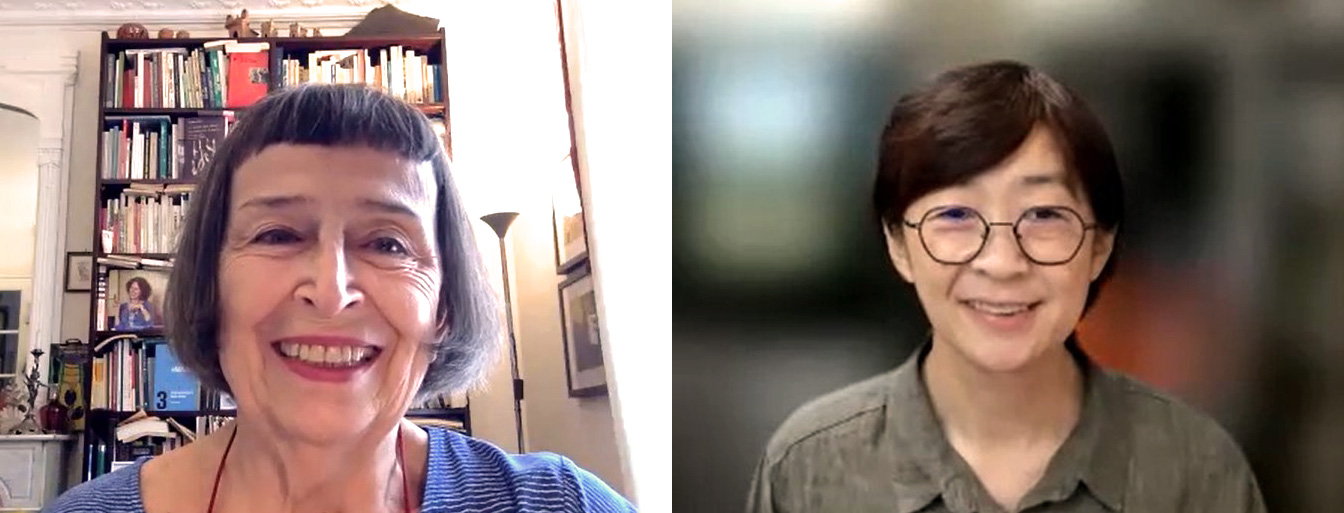
Related contents
-
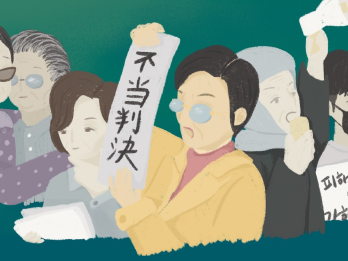
- 한일양국의 시민들과 함께 ‘위안부’문제에 관한 공동연구를!
-
[2022 기림의 날 특집] 문제의 극복을 위하여 위안부 이슈 관련 역사 인식을 한일 시민들이 함께 다각적으로, 냉철하게 연구 검토하면서 공동의 인식을 만들어나가는 작업이 급선무라고 생각합니다.
-
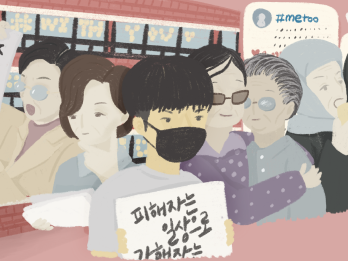
- 다큐멘터리 〈애프터 미투〉를 통해 본 증언을 기록하는 일
-
[2022 기림의 날 특집] 증언 기록은 여전히 도전을 필요로 하는 일이며, 도전이 있어야 더 많은 목소리가 세상에 나올 수 있을 것이다.
-
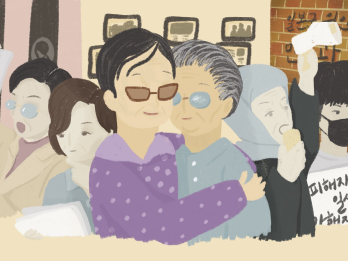
- ‘지역’에서의 일본군‘위안부’ 운동: 경상도 지역 역사관과 ‘지역성’에 대하여
-
[2022 기림의 날 특집] 김문숙 회장의 별세로 인해 야기된 부산정대협과 역사관의 변화 노력은 최근 새로운 전환의 시점에 직면해 있는 국내 일본군‘위안부’ 운동에 몇 가지 의미 있는 질문을 던진다.
- Writer Rada Iveković
-
Rada Iveković is a French educator, philosopher, and writer of Yugoslav origin. She worked as a professor in the Philosophy Department of the University of Paris-8 (Vincennes à St. Denis) and at the Collège international de philosophie, Paris. Iveković’s last book was Migration, New Nationalisms and Populism: An Epistemological Perspective on the Closure of Rich Countries (2022).
- Writer Young-Gyung Paik
-
Young-Gyung Paik is a professor of sociology at Jeju National University. Her research topics have included women’s health and healthcare, historical memory, and social suffering. Recently, she has been working to draw connections between the climate crisis and the issues of caring and commons. She believes the free and equal relationships among citizens, harmonious and ecological lives, and problems of historical memory have enormous impacts on healthy living. She is an editorial board member for The Quarterly Changbi and has co-written the books What Masks Tell Us, Battleground, From “Me” Alone to “Us” Together, and Frankenstein’s Daily Life.